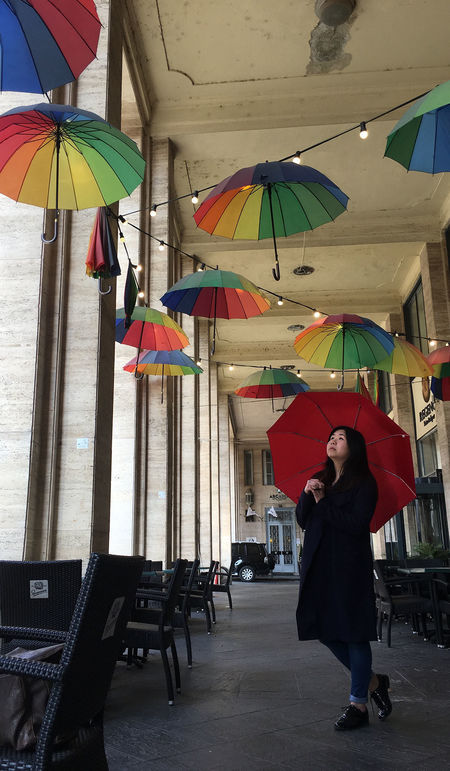
LGBTQ+ students within the Notre Dame community successfully study abroad every year with Notre Dame Global’s various study abroad programs. Studying abroad presents a unique opportunity to explore another culture in depth which allows you to further discover your own identity. While there are many positive aspects of this discovery, we recognize some of the inherent challenges study abroad presents to students identifying as LGBTQ+. Every country around the world has varying laws, customs, and beliefs about the LGBTQ+ community and, therefore, will react and treat LGBTQ+ students in a different way. While LGBTQ+ students successfully study abroad with NDG, there are important factors to consider, and we hope this guide can serve as a good starting point as you think about the best location for you.
The most common challenges LGBTQ+ students may experience abroad include the following:
Acceptance of Identity - Feeling out of place and/or not accepted in a foreign, and sometimes unfriendly, environment.
Safety/Discrimination - Familiarizing yourself with how your sexual or gender identity is viewed not only socially, but legally; living in a location where you may need to ‘hide’ your identity. Sexual harassment and assault may be defined differently or not at all in your host country. Remember, Notre Dame provides support to students who experience sexual harassment or assault.
Self Expression - Experiencing a different understanding of what it means to identify as LGBTQ+ in your host culture.
Travel - Being aware of the customs and laws of each location to which you travel. Ensuring your travel documents correctly represent your identity.
Local Support - Knowing who you can go to on-site with questions related to your identity.
In collaboration with the Gender Relations Center (GRC), Study Abroad has compiled information regarding the selection of programs, questions to ask yourself, and additional resources. We encourage you to contact a Study Abroad program director or the GRC if you have location-specific questions, would like to talk to a study abroad returnee who identifies as LGBTQ+, or if you would like to discuss your personal questions or concerns.

Selecting a Program
Choosing a Country
In many countries around the world, acceptance and inclusion of LGBTQ+ people has come a long way. However, this isn’t the case in all countries. It can be challenging to understand how some countries may not be as accepting of your identity. This is why it is crucial to understand the LGBTQ+ culture of a country before leaving for your study abroad program as it’s important to understand that what is accepted in our society might be illegal in others. Studying abroad as an LGBTQ+ student adds another layer of preparation to the study abroad process, and there are additional things to be aware of throughout your time abroad, too. That being said, LGBTQ+ students are not banned from studying abroad in any country in the world. What you should be aware of, however, is that your reality might be different abroad, and adjustments in behavior might be necessary.
Expression and Acceptance
An important consideration when choosing a study abroad program is your comfort level with self-expression as it relates to your LGBTQ+ identity. For example, if you would prefer a location where you can freely express yourself or get involved with LGBTQ+ activities at your host institution, you may want to consider programs in the Global North (especially those in Northern Europe). While parts of Asia, Africa, and Latin America are accepting of the LGBTQ+ community, many parts of the world do not approve of LGBTQ+ identification. You are welcome to study abroad in all locations, but for your safety, we recommend to be cautious of publicly displaying your LGBTQ+ identity.
Health and Safety
Matters related to health and safety should be considered when choosing a program. Topics such as medication and therapy access, making updates to official documents (such as your passport) prior to study abroad, etc. would need to be discussed proactively to ensure you can stay healthy abroad. Accommodations and housing placement may also need to be discussed with a program director in advance.
Dual Identities
Another factor to consider is how your other identities, such as your race/ethnicity, religious identity, and/or your socioeconomic status, may impact your study abroad experience. For example, LGBTQ+ students of color may have additional concerns regarding safety as you consider the host community’s response to both your race/ethnicity and sexual orientation. Similarly, LGBTQ+ religious students may also be concerned with safety depending on attitudes toward and within certain religious groups in their host country.
Questions to Ask Yourself
Before departure, it is important to think about the culture of your host country and attitudes towards the LGBTQ+ community. Some questions for you to consider:

- What are the laws regarding homosexuality and gender identity in my host country? If there are safety issues for the LGBTQ+ community, will I alter my behavior?
- What is the social attitude towards the LGBTQ+ community in my host country? Are there any current news stories about LGBTQ+ events? Are there any LGBTQ+ publications, advocacy organizations, or LGBTQ+-friendly establishments in my area?
- Are sexual orientation and gender identity openly discussed or more taboo in my host country?
- How LGBTQ+-friendly are the host institutions? Will I be staying with a host family who may or may not be accepting if I come out?
- What are the cultural norms for healthy relationships and friendship?
- Will I be publicly “out” in my host country? To my program’s director? My classmates? People I meet in-country?
- What does LGBTQ+ expression look like in my host country? How does it compare to LGBTQ+ expression at ND? In my hometown?
- Is it important to me to participate in LGBTQ+ activities and events while abroad?
- Are there resources for LGBTQ+ students in my host country or at my place of study?
- Does the information on my legal documentation match my gender identity (e.g. my passport or housing placement while abroad)?
- Is the language of my host culture gendered? If I identify as transgender, gender non-conforming, or non-binary, will it be difficult for me to adapt?
Additional Resources
General Guidance and Tips
LGBTQI+ Travel Information - U.S. Department of State
LGBTQ Guide from GoAbroad.com - Great resource for studying abroad as an LGBTQ student
Diversity Abroad’s LGBTQ+ webpage - Things to think about as you consider studying abroad
LGBTQ+ Rights, Laws, and Country-Specific Information
- Human Rights Watch - Reports on human rights issues for countries around the world
- Equaldex - Collaborative LGBTQ+ Rights knowledge base
- International Lesbian, Gay, Bisexual, Trans, and Intersex Association - Check out their maps on sexual orientation laws across the globe and the Trans Legal Mapping Report
- Country specific guides - Country-specific travel and culture website focused on LGBTQ+ life worldwide through in-person stories, archived news reports and photos covering over 190 countries
Scholarship Opportunities - External Funding
- Rainbow Scholarship
- Point Foundation Scholarship Fund
- Pride Foundation
- Gamma Mu Foundation
- APIQWTC Scholarship
- Collin Higgins Youth Courage Award
Sexual and Discriminatory Harassment
Unfortunately, sexual harassment and assault can happen to college students abroad, regardless of their gender identity or sexual orientation, just like it happens here in the U.S. The University encourages students to report all incidents of bias, discrimination, and/or harassment so that the University can take appropriate action to assist the students involved. Below are reporting options. The course of action taken by the University to support the students involved will depend on the facts and circumstances of each report. Please know that submitting a report while abroad does not necessarily mean you will be required to return to the U.S. unless medically necessary.
Reporting an Incident
To report an emergency
- Submit an online report of an issue or incident visit Speak Up!
- You should contact NDPD at (574) 631-5555, your Study Abroad program director, and reach out to your Notre Dame global staff or host institution staff.
- Learn more about how you can educate and protect yourself on our NDI Travel & Safety website.
If you have a complaint involving sexual harassment, sexual misconduct, or sexual assault or if you have questions about Notre Dame’s policies or procedures in these areas, please contact:
- Notre Dame's global staff or host institution staff (Non-confidential)
- Notre Dame Title IX Coordinator or Deputy Coordinator (Non-confidential)
- Study abroad local program resources (Non-confidential)
- GeoBlue Insurance offers 24/7 confidential assistance for both physical and mental health needs. (Confidential)
- Sexual Assault Support and Help for Americans Abroad (SASHAA) offers 24/7 confidential assistance. (Confidential)
- Rape, Abuse and Incest National Network (RAINN) has an online chat for support (however, RAINN is not able to provide information about local resources abroad). (Confidential)
- Additional confidential resources can be found here.
What is the difference between a confidential and non-confidential resource?
Sharing information with a non-confidential resource will result in an investigation. The nature and extent of an investigation will depend on the extent to which the University has enough information to reasonably determine key facts (e.g., time, date, location and names of parties involved in an alleged incident). For study abroad students, this means that NDG Global Safety & Security will be notified to ensure you have appropriate care and support resources.
Sharing information with a confidential resource means these professionals will honor confidentiality unless there is an imminent danger to the individual or others. As a study abroad student, it is important to understand the local laws and customs regarding the reporting of sexual harassment and assault as they vary country to country.